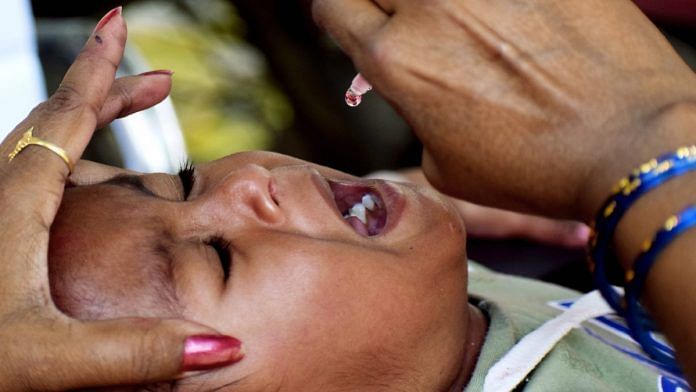Kolkata: Eight years after India was declared polio-free by the World Health Organisation (WHO), traces of Type-1 polio virus have been detected in a sewage sample collected from Borough 15 in Kolkata’s Metiabruz area. The country’s last recorded case of wild polio virus was detected in West Bengal’s Howrah district in 2011.
India, along with all of the Southeast Asia region, was declared polio-free by the World Health Organization (WHO) on 27 March 2014. The polio-free status is regularly assessed by the WHO’s Regional Certification Commission for Polio Eradication.
Deputy Mayor of the Kolkata Municipal Corporation (KMC), Atin Ghosh, said Wednesday that the civic body has been on alert since traces of polio virus were found in sewage samples collected from Metiabruz.
Addressing the media at the civic body headquarters, Ghosh said: “We are monitoring and checking across wards if any child has been infected with polio. The mayor and I have held meetings with public representatives from Metiabruz and asked them to ensure every child takes the polio drops during the drives conducted by KMC.”
Explaining that there are three types of polio virus, Paediatrician Dr Debashish Mukherjee told ThePrint: “Now, this Type-1 virus that has been detected from the sewage could have been a vaccine-derived polio virus, which means a child who was given the polio vaccine defecated in the open and then it was detected through routine surveillance.”
The WHO too, had cautioned that countries declared polio-free “face the threat of outbreaks due to circulating vaccine-derived poliovirus (cVDPV)”.
Also Read: AstraZeneca vaccine safe, effective in kids, finds Lancet study. WHO still says for adults only
India’s polio-free tag
Known to be a highly infectious disease, polio affects the nervous system and can cause permanent paralysis and, in some cases, even death. It is transmitted from person to person mainly through the faecal-oral route.
At the time of declaring India polio-free in 2014, the WHO had specified that the certification meant 80 per cent of the world’s population “now lives in polio-free certified regions”.
While Type-2 and Type-3 polio has been eradicated, global efforts are still underway to eradicate Type-1 polio virus, which was last detected in a child (younger than 5 years of age) in Malawi in southern Africa on 17 February 2022.
The polio vaccine itself is essentially a live attenuated virus, which suggests the polio virus can be detected in samples collected from areas with high vaccination rates.
A top official with the West Bengal Health Department confirmed to ThePrint that the polio virus was detected in a sewage sample in Kolkata about four-five months ago, and the health department has since held a series of discussions with the WHO in this regard.
“The virus could have come from the gut of a person who has immunodeficiency,” the official said on condition of anonymity, adding that the health department has collected samples from children in the Metiabruz area, apart from carrying out surveillance.
The official said that, so far, none of the children was found to have immunodeficiency. “We are vigilant, and our surveillance is excellent and, thus, we were able to detect the virus in the first place,” he added.
ThePrint reached Sharmila Sharma, WHO’s Communications Officer in New Delhi, to inquire about the WHO’s communication with the West Bengal Health Department in this regard. This story will be updated once a response is received.
In 2016, there were reports from Telangana of the virus being detected in sewage samples.
Routine examination of sewage samples is key to maintaining India’s polio-free status. In areas where the virus is detected, the polio vaccination drive is stepped up as a containment measure.
Asked about the detection of polio virus in the Kolkata sewage sample, Dr Kaushik Chaki, Honorary Secretary of West Bengal Doctors’ Forum, told ThePrint: “In a city like Kolkata, which should have a very high immunisation drive, to find the polio virus is a matter of grave concern.”
(Edited by Amrtansh Arora)
Also Read: Covid during pregnancy doubles babies’ risk of delay in speech, motor skills, study finds



